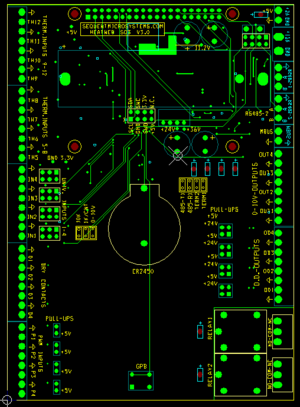Heatweb BEMS Hat
- 8 x dedicated NTC temperature sensor inputs
- 4 x universal inputs for volt-free contacts, 100Hz pulse signals, 0-10V or either 1k or 10k NTC thermistors
- 4 x volt-free / 100Hz pulse inputs
- 2 x 10A change-over relay outputs
- 4 x PWM inputs with jumper switched pull-up resistors
- 4 x PWM outputs with jumper switched pull-up resistors in both 5v and 24v
- 4 x 0-10v outputs
- 2 x RS485 lines for Modbus or bespoke protocols, with jumper switched terminating resistors
- On board Modbus for daisy chaining multiple boards to a single controller
- M-Bus meter communications
- On-board battery supported uninterruptable power supply
- Real time clock
- General purpose input button
- 3 x user definable LEDs
- Fan control and connector
- Runs from a 12v power supply
- 24v uninterruptable output power for valves generated on-board
- 5v uninterruptable output power for sensors generated on-board
- 36v uninterruptable output power for M-Bus generated on-board
The Heatweb BEMS Hat runs from a 12v dc supply, generating 5v for the board, 24v for valves, and 36v for M-Bus, using on-board dc-dc converters backed up by a rechargeable battery. A coin cell is used to power a real-time clock.
WiFi, Ethernet and Bluetooth are provided by the parent controller board.
A number of the inputs are universal, and can be switched between NTC, 0-10v, or volt-free / pulse inputs (jumper selected). This ability to alter the hardware setup increases versatility significantly.
The addition of M-Bus allows us to connect to heat meters as standard, making the board a stand alone solution to open-sourcing meter data, and to use meter data within control logic.
The battery backup allows us to safely shut-down all valves and the controls when power is removed. This overcomes a common problem with HVAC systems, where valves typically remain open, destroying network performance.
